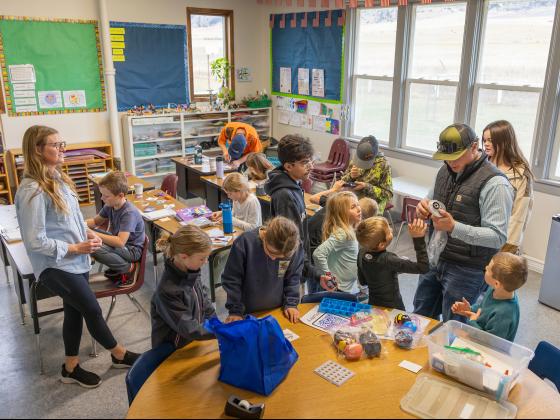BOZEMAN — At the end of November in Montana, there were 51 openings for special education teachers, and a report on the state’s teacher shortage last year identified special education as one of the top three critical shortage areas in Montana.
At the same time, many Montana children need and benefit from the services that special education teachers provide, according to Leslie Rogers, assistant professor in the Montana State University Department of Education and an expert in special education. Those include both children on individual education plans, or IEPs, and the general student body.
“What special education teachers do is great for students with disabilities, as well as for the entire school community and other students in that school,” Rogers said.
To help address the state’s need for special education teachers, MSU will soon begin offering a special education teaching certificate after receiving approval from the Montana Board of Regents. The certificate is for undergraduate students majoring in education who wish to develop teaching skills that will help them better support all students, including those with disabilities, according to Sarah Pennington, an associate professor in MSU’s Department of Education who helped develop the certificate.
“A lot of students are struggling in school and have great needs, whether or not they have an IEP,” Pennington said. “The strategies we teach in our special education certificate can help all those students. If you equip teachers to be able to identify and intervene with special instruction, engage in progress monitoring, and adjust the program based on students’ needs – all skills that we teach in this program – that will serve all teachers and students very well.”
MSU education students interested in pursuing a special education teaching certificate can begin taking classes toward it in the spring 2025 semester. Twenty-four credits are required, including courses on exceptional learners; supporting diverse learners through collaboration; assessment and intervention; special education law; methods of instruction for students with disabilities; literacy assessment; and behavioral principles. Pennington noted that courses for the certificate were developed using the Montana Professional Educator Preparation Program standards related to special education.
“We selected courses to align with these standards to assure that students who complete this certificate have the knowledge and competencies required for licensure as a special education teacher in the state of Montana,” Pennington said.
Previously, undergraduate education students enrolled at MSU in Bozeman who wanted a special education endorsement had to travel to MSU Billings or UM Western in Dillon. Travel costs and additional tuition made those options less attractive and attainable, Pennington said.
“By offering this endorsement certificate on our own campus, we are removing the travel and financial obstacles our pre-service teachers face when pursuing a special education teaching endorsement,” she said. “In particular, offering this certificate at our campus will allow students to take advantage of the ‘flat spot’ in tuition – which means a student paying for 12 credits in a semester may take any additional credits for no addition tuition – and add this endorsement at little to no additional cost.”
Importantly, the program allows students to take one or two classes toward the certificate each semester, said Lauren Davis, head of the MSU Department of Education. That lets the certificate fit in with the student’s existing coursework so that it doesn’t take longer to graduate.
The new special education certificate is one of several ways MSU is addressing a need for more schoolteachers in Montana, according to Davis. She noted that, in addition to the 51 openings for special education teachers, there were 90 reported openings for elementary school teachers as of Nov. 29.
MSU’s efforts have included expanding alternate pathways to education in hopes of making the college’s offerings more accessible to individuals living outside of Bozeman, as well as growing its dual enrollment programs and developing a teacher residency program in collaboration with the Montana Office of Public Instruction. The university has also invested in ongoing efforts to strengthen rural education across the state.
The education department’s dual enrollment courses are gathering steam. In partnership with the Montana Digital Academy, the department is offering Education 101 and other early coursework for high school students who wish to get a head start on progress toward their college degree.
“We hope these dual enrollment courses will feed our pipeline (of future teachers),” Davis said. “So far, we’re seeing some good, robust enrollment.”
MSU’s Montana teacher residency program offers students a yearlong placement in a rural area. Students complete the first three years of their coursework at the MSU campus and then have the option to finish their remaining coursework remotely from their placement site. Participating students receive a $1,400 monthly stipend; some may also receive housing assistance, Davis added. The program is funded under House Bill 833 passed during the 2023 legislative session.
Finally, Davis noted that the department is developing what are known as “2+2” programs, which allow students to complete their first two years of coursework at a community college or a tribal college before transferring to MSU for their final two years.
“We want to provide access to any Montanan or out-of-state student to our high-quality programming, even if distance or finances are an obstacle,” Davis said.
For Davis, the efforts all lead toward one outcome: producing excellent educators who can help all students thrive.
“Our goal is to get more certified teachers who have been through a robust program into Montana classrooms,” Davis said. “We want them to enter the field having had practical experiences and targeted feedback so that they feel confident in their skillset. Ultimately, our goal is to serve our MSU students well, as well as the (pre-kindergarten through 12th grade) students and their communities.”




